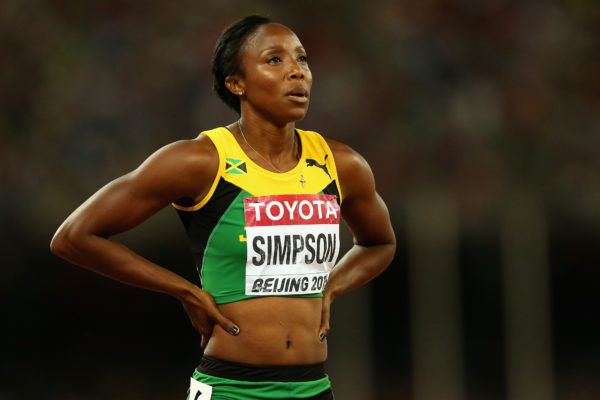Olympic Gold Medalist Sherone Simpson and Sports Psychologist Dr. Candice Williams Weigh In on the Mental Fragility of Some Black Female Athletes
Mental health emerged as the theme of professional sports over the past few months leading up to the 2020 Tokyo Olympics. Tennis champion Naomi Osaka was openly criticized after the 23-year-old announced she would not be doing press interviews and ultimately withdrawing from the French Open, citing her mental health.
Then, in a move that stunned observers, gymnastic champion Simone Biles dropped out of several Olympic events in Tokyo, citing struggles with her mental health. Simpson sympathized with Biles and Osaka.
Jamaican Olympic track and field gold and silver medalist Sherone Simpson is no stranger to the mental pressure of sports. “It is very important that we know when the time comes to leave a sport, or when we know that we are not at our best and we have to take a break. Because that break is what will help the athlete to get back stronger,” Simpson said. “Especially on the big stage — World Championships, Olympics — as athletes we have to be mentally ready. It’s not all about being physically prepared, but also we have to make sure that our mental state is intact,” Simpson added.
Simpson sympathized with Biles and Osaka. “I can remember before, when I used to compete, I used to read everything, watch the news, and sometimes it is very brutal and it would affect me negatively,” Simpson said.
Ohio State University sports psychologist Dr. Candice Williams said that this treatment is nothing new, especially when it comes to Black athletes. “These young women are being judged and criticized based on their athleticism, the way that they look, how they choose to live their lives,” Williams said. “It’s just that historically we have been — as a culture and a subset of people as black women — we’ve been held to a higher standard, and we feel that those pressures.
Williams says athletes need to be set up for success when it comes to managing mental health. “Empowering the athlete to be able to say ‘You know what, I have an agent that manages my career, I have a financial adviser that manages my finances, I have a performance coach or personal trainer that helps me train my body from the neck down, why not have a therapist on my team that can help me in terms of managing my mental health?” Williams said.
“I know some of us as Black women have a hairstylist on call in our phone that if we need a silk press, we need a relaxer, we need a deep condition, we can call that person and have them on speed dial,” she continued. “Why not have a therapist that you’ve vetted, that you know does good work on your team?” She also adds that even if an athlete is not in a crisis, there are important concepts they should understand.
“I often talk to athletes about perception versus reality,” Williams explained. “Being an athlete, you are put in that category of a performer or even an entertainer, and a lot of the time, people are looking to you to entertain themselves or to help them get a release from their own real life, not realizing that you are a real person. And so one of the things that I oftentimes talk to them about is setting boundaries. What does that that look like for you when it comes to you know what you put on social media and what you share with the rest of the world?”
Both Simpson and Dr. Williams are exceptionally proud of the role Black women have played in bringing mental health to the forefront. “We have a platform and we’re using it. And not only are we speaking it, but we’re putting action behind it which is equally as powerful,” Williams said. “It speaks volumes and helps other athletes who are going through similar issues and not talking about to see, especially the top athletes — Naomi Osaka, Simone Biles — to see, you know what? They’re at the top of their game and they’re able to step away to take a break. Hats off to all those females who are able to take that break to say, ‘You know what, my mental health is important. I have to put it first, I have to take the break and then come back stronger. Because I have to do it for me. I have to put myself first.’”

